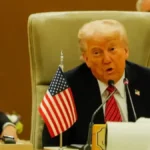By John Danfulani
Nigeria’s media ecosystem is awash with news of the adoption of the African Development Party (ADP) by the arrowheads of a so-called coalition whose numero uno goal is sacking President Ahmed Bola Tinubu of the Federal Republic of Nigeria and Governor Uba Sani of Kaduna State. Characteristically, analysts are reeling out multifaceted commentaries on this development. One thing is clear: this story will linger, primarily because of the stature and notoriety of its leading proponents—Alhaji Atiku Abubakar, Mr. Peter Gregory Obi, and Mallam Nasir Ahmad El-Rufai, among others.
This development suggests that the former Vice President and serial presidential contestant, Alhaji Atiku, alongside Mr. Obi and Mallam El-Rufai, have deserted their political parties for a new tent called the ADP. Their actions reinforce a well-known fact about their party-switching history: they are combustible political elements who shift allegiance based on selfish interests centered around the lust for power.
Alhaji Atiku has been in PDP, ACN, PDP again, APC, back to PDP, and now ADP. Mr. Obi moved from APGA to PDP, then LP, and now ADP. Mallam El-Rufai has danced through PDP, APC, SDP, and now ADP. A casual survey shows these men are political nomads who migrate for personal aggrandizement rather than principle or purpose.
Three key variables effectively propel political ships in Nigeria: political structures, financial capital, and grassroots support. On political structures, their new abbey lacks viable, nationwide reach to support a successful challenge. Regarding financial capital, it’s undeniable that a humongous war chest is needed to mount a campaign capable of capturing the center and some states. Most critically, they require massive grassroots support—if their aim is truly to dethrone President Tinubu and Governor Sani in 2027. So far, they fall short on all three essential electoral ingredients.
This political clique, driven by inordinate and corrosive ambition, remains shackled to the myths of their 2015 merger and its subsequent electoral success. They are consciously or unconsciously ignoring the shift in Nigeria’s political terrain—the savviness of their opponents, the rising political consciousness of the electorate, and the discovery of their own vacillating and combustible nature. This blindness clouds their strategic thinking. What they are doing, in truth, is what Robert Greene calls “fighting the last war.” And generals who fight the last war rarely, if ever, win the next.
These men are chronic belittlers who assume Nigerians suffer from collective amnesia. Otherwise, how could they expect the people to trust a project piloted by kleptocrats, totalitarians, and primitive accumulators? Between 2003 and 2007, Mallam El-Rufai indicted Alhaji Atiku and recommended he be barred from the 2007 presidential race. While in government, Mr. Obi allegedly focused on promoting his private business interests, investing state funds in his own ventures. The Kaduna State House of Assembly indicted Mallam El-Rufai, accusing him of enabling actions that cost the state billions. With these compelling and manifest facts, do they truly believe Nigerians will swallow their electoral bait and hand them mandates in the 2027 election cycle?
Their marksman, Mallam El-Rufai, planned to anchor their project on regional sentiment. Unfortunately, his eight-year reign as a political pharaoh fractured the delicate bridges of northern unity. Actions such as compensating foreign-based killers of fellow northerners while refusing to resettle local victims of what many liken to genocide erased any sprint toward the “One North, One Destiny” ideal once championed by the late Sardauna of Sokoto. Today, when he invokes the north, many Nigerians ask: Which north is he talking about?You cannot destroy northern cohesion through recklessness and whimsy, then expect homogeneous support for a project rooted in personal gain.
This bunch of angry hearts continues to scapegoat President Tinubu for every tribulation the country faces, conveniently ignoring the fact that many of these problems predate independence in 1960. Ironically, every one of them has held power for at least eight years. Mallam El-Rufai has ruled in some capacity for 16 out of the 26 years since this republic began in 1999. Alhaji Atiku served eight years as Vice President. Mr. Obi governed Anambra for eight years. Then there’s Mr. Babachir, the disgraced former SGF sacked for conflict of interest. With such a cast, how can they possibly disown their responsibility for the country’s troubles?
This brigade of sore losers must never be allowed to get close to power again. They have nothing to offer but vendetta and continued pillaging of the public treasury. Anger, hatred, and vindictiveness are not economic blueprints or security policies. Nigerians must wield the power of their thumb to keep them away from the levers of governance. It’s time to starve their hunger for power and leave them to wander in the political wilderness—until thy kingdom come.
READ ALSO: Bala, Damagun are PDP’s biggest problem — Ex-Benue gov, Suswam






